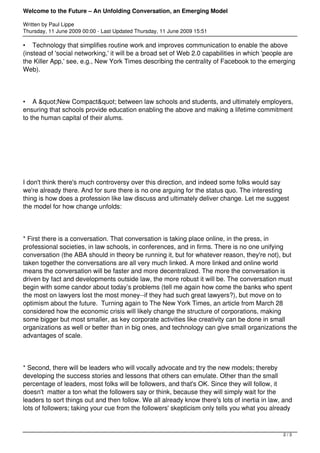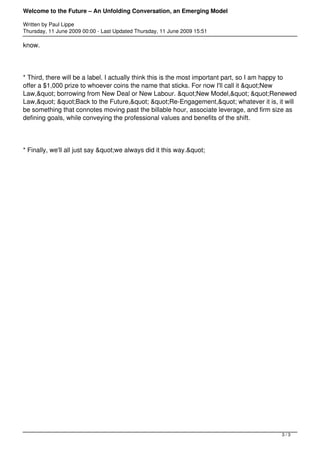Welcome To The Future %E2%80%93 An Unfolding Conversation An Emerging Model
- 1. Welcome to the Future – An Unfolding Conversation, an Emerging Model Written by Paul Lippe Thursday, 11 June 2009 00:00 - Last Updated Thursday, 11 June 2009 15:51 I was on a panel with a managing partner from a large firm the other day and he said something very compelling: "My job as managing partner is to reduce from 60 to 36 months the amount of time it takes our partners to go from 'why would we every do that' to 'we've always done that.'" We're beginning a period of significant change in law.Ěý The outlines of the "New Model" are pretty clear: •ĚýĚýĚý A more sophisticated view of client complexity, leading to a client-centric rather than lawyer-centric model of practice, driven by shared goals to create a more well-ordered society and the competitive survival of the client. •ĚýĚýĚý Greater engagement between firms and clients, leading to better collaboration between firm lawyers and in-house lawyers, and greater collaboration across the firm. •ĚýĚýĚý A more transparent notion of quality and value in assessing legal services and lawyers. •ĚýĚýĚý Pricing that shifts the emphasis from time and materials (billable hours) to value as defined by the client. •ĚýĚýĚý Dramatically less associate leverage in law firms. •ĚýĚýĚý Overall law firm revenues will be down 10 to 20 percent from their peak, but the differences between winners and losers will be much more dramatic, and firms will dramatically reduce all expenses not essential to delivering value to clients. 1/3
- 2. Welcome to the Future – An Unfolding Conversation, an Emerging Model Written by Paul Lippe Thursday, 11 June 2009 00:00 - Last Updated Thursday, 11 June 2009 15:51 •ĚýĚýĚý Technology that simplifies routine work and improves communication to enable the above (instead of 'social networking,' it will be a broad set of Web 2.0 capabilities in which 'people are the Killer App,' see, e.g., New York Times describing the centrality of Facebook to the emerging Web). •ĚýĚýĚý A "New Compact" between law schools and students, and ultimately employers, ensuring that schools provide education enabling the above and making a lifetime commitment to the human capital of their alums. Ěý I don't think there's much controversy over this direction, and indeed some folks would say we're already there. And for sure there is no one arguing for the status quo. The interesting thing is how does a profession like law discuss and ultimately deliver change. Let me suggest the model for how change unfolds: * First there is a conversation. That conversation is taking place online, in the press, in professional societies, in law schools, in conferences, and in firms. There is no one unifying conversation (the ABA should in theory be running it, but for whatever reason, they're not), but taken together the conversations are all very much linked. A more linked and online world means the conversation will be faster and more decentralized. The more the conversation is driven by fact and developments outside law, the more robust it will be. The conversation must begin with some candor about today’s problems (tell me again how come the banks who spent the most on lawyers lost the most money--if they had such great lawyers?), but move on to optimism about the future.Ěý Turning again to The New York Times, an article from March 28 considered how the economic crisis will likely change the structure of corporations, making some bigger but most smaller, as key corporate activities like creativity can be done in small organizations as well or better than in big ones, and technology can give small organizations the advantages of scale. * Second, there will be leaders who will vocally advocate and try the new models; thereby developing the success stories and lessons that others can emulate. Other than the small percentage of leaders, most folks will be followers, and that's OK. Since they will follow, it doesn'tĚý matter a ton what the followers say or think, because they will simply wait for the leaders to sort things out and then follow. We all already know there's lots of inertia in law, and lots of followers; taking your cue from the followers' skepticism only tells you what you already 2/3
- 3. Welcome to the Future – An Unfolding Conversation, an Emerging Model Written by Paul Lippe Thursday, 11 June 2009 00:00 - Last Updated Thursday, 11 June 2009 15:51 know. * Third, there will be a label. I actually think this is the most important part, so I am happy to offer a $1,000 prize to whoever coins the name that sticks. For now I'll call it "New Law," borrowing from New Deal or New Labour. "New Model," "Renewed Law," "Back to the Future," "Re-Engagement," whatever it is, it will be something that connotes moving past the billable hour, associate leverage, and firm size as defining goals, while conveying the professional values and benefits of the shift. * Finally, we'll all just say "we always did it this way." 3/3


